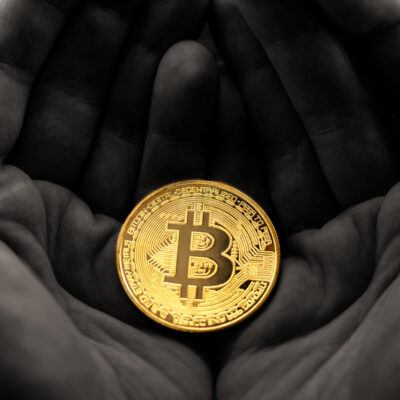
You’ve heard of the red pill. You’ve heard of the blue pill. If you’re really deep into internet culture, then you’ve maybe also come across a black pill and a white pill. Now there’s the bitcoin orange pill.
What’s the orange pill?
For many years now, Bitcoin has been strongly associated with the color orange. The exact tint of orange may vary, but the Bitcoin logo is usually colored using orange with the hex code #F2A900. However, I’ve also seen the hex color code #F6911D used in some contexts, which is a bit more vibrant and deep orange, and I’m actually using #F7931A here on the my blog, which is just a better hue for link visibility on a white background.
Bitcoin wasn’t always orange! The original bitcoin logo was a simple gold coin with the letters “b” and “c”, for bit-coin. The third iteration of the bitcoin logo was chosen to be orange for no reason other than the creator thought that it inspired consumer confidence. I guess he was right, because despite a few alternate suggestions over the coming years, his version of the logo stuck and Bitcoin was forever locked into the orange color symbolism.
What Does It Mean To Take The Bitcoin Orange Pill?
Taking the bitcoin orange pill, or being orange-pilled means that you start to see things through the lens of bitcoin. Things would be better with bitcoin, worse because they don’t have bitcoin. It’s bitcoin on the brain!
1. Bitcoin Is Better Than Fiat Currency
The first step towards being orange-pilled is to realize that bitcoin is a superior money to fiat currency. No matter what country you’re in, fiat currencies such as the US dollar, the Swiss Franc, and the Japanese Yen are just printed at the will of the government. A small group of people sit behind closed doors and decide what’s good for you, then execute that decision.
Because fiat currency is created through lending, the artificially low interest rates and economic stimulus that expands the money supply tends to overwhelmingly benefit the wealthy. This is called the Cantillon Effect. Wealthy people are able to borrow larger amounts of money, at cheaper rates, and invest in hard assets that appreciate over time. For example, a millionaire who owns real estate and stocks can get a larger and cheaper loan from the bank than someone working a minimum wage job.
Bitcoin Beats Inflation
When someone borrows money from the bank, the money supply expands, causing inflation. This is by design. Wealthy people recognize that holding too much cash causes their wealth to be inflated away over time, so they purchase hard assets to protect the purchasing power of their money. Those assets go up in value as the purchasing power of money decreases. Because poor people do not have access to the same type of loans, they tend to own fewer (or no) assets.
As asset prices go up, the wealthy gain access to more capital at cheaper rates, and the poor lose more purchasing power, increasing wealth inequality over time. This system rewards borrowers and punishes savers. Even at a conservative inflation rate of 2%, a cash-only savings account loses more than 50% of its purchasing power over the course of a person’s lifetime.
Fiat currency makes the rich richer and the poor poorer.
You can’t print more bitcoin, even if it’s super-duper necessary. It would require ten million current bitcoin owners to all agree at the same time that they want to make themselves poorer. Bitcoin takes control of the money out of the hands of the government, and by operating on a neutral, permissionless monetary standard, our global financial system becomes fairer.
Related Content
2. Bitcoin Is Better Than Gold
Gold was the standard store of value and medium of exchange for most countries around the world for thousands of years, and there’s a good reason for it: you can’t easily make more of it. It’s also divisible, durable, portable, and easily recognized. For thousands of years and across hundreds of cultures, gold was the best money.
Gold was great money for a long time, but it was eventually abandoned for fiat. Why? For a globalized society, conducting transactions over a long distance has some issues in the portability department.
Gold is heavy, so it takes a lot of energy to transport it from place to place. Storing and securing gold is also very expensive. Gold is an inert metal, so it doesn’t take much to “preserve” it, unlike copper and silver, but it does require bank vaults, security guards, and secure transport trucks and ships.
Many people have been advocating for a return to the gold standard, but the problems with gold haven’t changed.
Digital Is Better
By contrast, bitcoin is very cheap to store, secure, and send around the world. You can secure a billion dollars worth of bitcoin with a single $200 hardware wallet. Bitcoin itself is unable to be compromised due to the distributed nature of the ledger (ten thousand copies distributed around the world), and with some simple techniques like mulsig, time locks, or a wallet passphrase, you can secure your bitcoin from theft or brute force attack.
In addition, you can send $0.10, or $1.00, or $1,000,000,000 around the world, any time of day or night, and have it be considered “final” in less than an hour. Even better, you can use your own personal bitcoin node to verify the validity of the transaction. A node will cost you about $200 to build yourself, or maybe $500 to buy pre-made. Compare that with the process of melting down gold bars to make sure they aren’t filled with tungsten!
Lastly, bitcoin is digital, so it doesn’t corrode, dent, melt, or get misplaced. Secured properly, your bitcoin will last forever.
Bitcoin is clearly superior to gold in the categories of portability, durability, divisibility, and recognizability (verifiability). Gold was great for a long time, but Bitcoin is here now, and Bitcoin is better.
3. Bitcoin Is Better Than Altcoins
2017 was the year of the altcoin, and at that time, many, including myself, believed in a multi-coin world where there would be a huge variety of digital assets, each with unique properties that would make them valuable. Then I did my homework.
Bitcoin is the only digital asset worth owning. Everything else is a security or a scam. There are a few different frameworks to understand this.
First off, the vast majority of altcoins have the clear and undeniable problem of not being decentralized or distributed. There is usually an inventor of the coin, a group of insiders with access to pre-mine holdings, and a board or foundation with control over the protocol. If a small group of people can control your coin, then it’s not at all like Bitcoin.
Altcoins Are Tech Companies
This is not unstoppable money. This is an investment in a tech company. I would consider that a kill-shot for the vast majority of altcoins. Why does bitcoin have value? Because it’s unstoppable money. Distributed and decentralized systems tend to become more centralized over time, and bitcoiners have worked hard to prevent centralized power within Bitcoin. Will altcoins become more decentralized over time? It’s highly unlikely.
Even if you are a big fan of Coin XYZ, you have to recognize that they made a tradeoff somewhere. That tradeoff needs to be identified, and the question to ask is if it makes your coin 10x better than Bitcoin.
There are no solutions. There are only trade-offs.
Thomas Sowell
There Are Always Tradeoffs
Making the blocks bigger and the block time faster doesn’t just make a better bitcoin. Increased block size means that it requires more advanced hardware to run a node, which means average users can’t afford to verify transactions, which means your blockchain is centralized to corporate entities and prone to state attack or technical issues.
If you make the block time faster, that means there are more blocks being produced in a shorter period of time, which then opens you up to more possibilities of orphaned blocks and blockchain reorganization, so you have to wait longer for final settlement.
There are plenty of altcoins out there which already exist and have made these tradeoffs. Why are they not popular? The answer may be that bitcoin is worse is better. What that basically means is bitcoin already works, despite not being “perfect”, and it’s where people have collectively decided to store their value across the globe. It would take a 10x, or even 100x improvement on bitcoin for people to move hundreds of millions, or even billions of dollars of value into an alternative, experimental cryptocurrency.
Changing the block size from 1mb to 2mb or changing the block time from 10 minutes to 5 minutes is not a game changer.
Blockchain gaming? Credit card rewards? These are gimmicks. A cute dog meme may entice some retail traders temporarily, but it’s not something that will replace bitcoin as digital money for the next 100 years.
There are many other issues with altcoins that I won’t get into here, so to conclude I’ll leave it as there is bitcoin, and there is the crypto industry. They are not the same.
4. Bitcoin Is Better Than All Other Types Of Wealth
As you start to learn more about how money works, you may look at your own portfolio and start to wonder what the tradeoffs are for not owning bitcoin instead. The most common types of investments today are stocks and real estate, but things like art, collectibles, and bonds would be included here as well.
Real estate has become a very popular way to store wealth in recent decades (remember, because fiat cash is trash), but there are some serious downsides. It’s illiquid. It’s not divisible. It’s expensive to own. It’s expensive to transact. It’s not easily transferrable. It’s location dependent. One major upside to real estate is that it can have cash flow, but empty apartments in Toronto or farmland without a farmer does not necessarily do that.
Stocks have their own issues. Individual equities are dependent on competent teams to effectively execute product sales, manage human resources, and maintain a brand in a competitive environment. Do you want your life savings dependent on how many iPhones Apple sells?
Even if the team delivers on all fronts, unexpected market conditions could tank the value of your savings. Index funds make it so you are not reliant on individual teams, but they have management fees, are illiquid, and you certainly can’t trade them cross platform.
If you want to store your wealth in something that’s liquid, divisible, accepted globally, and goes up in value over time, Bitcoin is the answer.
What About Index Funds?
I guess the only thing that I find hard to argue against is index funds for the global stock market or US equities. Historically, they have had decent returns and are relatively hands-off in terms of management. You meet or beat inflation and don’t have to do anything.
There are still tradeoffs of course, but in terms of “wealth”, they are not a bad option for a lot of people.
Some tradeoffs would be:
- index fund ownership isn’t private
- index funds are very confiscatable/censorable
- you can’t buy stuff with index funds
- you are still exposed to interest rate risk
Each one of these points have their own nuances, but we won’t go down those rabbit holes for now. The point is that when you are orange-pilled, you start to see that index fund investing isn’t perfect, and isn’t the only way to preserve purchasing power.
Bitcoin Is Money, Language, And Truth
Once you figure out that bitcoin is better money than fiat, gold, and altcoins, and all other types of wealth, you really start to go down the rabbit hole and think about what money is and what role it has in society. There are many ways to describe money, and each method can create a different framework for understanding.
Bitcoin Is Money, And Money Is Language
One interesting way to see money is as a universal language. Across cultures and across time, there are some undeniable things that people need, and therefore they ascribe value to them: Food for sustenance. Materials for shelter. Knowledge. Tools. Money is a medium of exchange that allows you to communicate your desire for valuable things.
Money allows you to create value in the present, store value for the future, and trade value based on personal economic calculations.
When you want to buy something, it says to the other person, “I value this item.” When the item is expensive relative to other items, it says, “This item is scarce.” No matter where you are in the world or what century you lived in, money allows you to communicate in a kind of unspoken language of value.
Perfect Money Is Perfect Language (Truth)
Taking this one step further, some make the case that Bitcoin is truth.
Bitcoin is truth in the sense that it is the first pure money the world has ever seen. All other moneys in the past have been corruptible. Stones and glass beads were able to be manufactured. Gold was able to be debased with lesser metals or confiscated. Fiat paper can be created out of thin air and loaned to the wealthy. With Bitcoin, none of those things are possible.
Because bitcoin cannot be printed, debased, or confiscated it cannot be corrupted. The only way to acquire bitcoin is to provide value to some other person, and voluntarily trade a good or service for it. Bitcoin represents a truth in societal values.
In a more literal sense, Bitcoin is truthful in that the network cannot be stopped, and the ledger cannot be changed.
Seeing The World Through Orange-Tinted Glasses

Being orange-pilled means that you start to see the world through orange-tinted glasses. In other words, Bitcoin starts to tint everything in your life. It doesn’t have to be that you talk about bitcoin all the time (although that tends to happen), but you start to see bitcoin principles in other parts of your life.
One common example of this that I can see in my own life is the idea of low time preference, and it’s begun to influence a lot of my personal decisions since I started to read about the origins of money and the impact of good money on a society over long periods of time. When I save money, I’m thinking in decades, not years. I think more about the lifetimes of my kids and (future) grandkids, and how my decisions now may impact them. I think about the tradeoffs of present vs future consumption of goods.
Fix The Money, Fix The World
Many people who get orange-pilled also start to question narratives in other areas of their lives as well. It’s a shock to the mind when you figure out how our money has been corrupted in the past 100 years. What are my other incorrect assumptions? About what else have I been lied to? Which trusted organizations have corrupt incentives?
For example, many bitcoiners change their diet from fiat food, namely foods which have become commonplace because they are cheap due to government subsidies. Examples could be processed carbohydrates and seed oils. Other bitcoiners may quit their fiat job in exchange for something more meaningful and impactful. A great book on this is The Fiat Standard, which discusses how corrupted money has corrupted many aspects of our daily lives.
Being orange-pilled doesn’t necessarily mean you’re obsessed with bitcoin, it just means that you get the deeper meaning behind Bitcoin. Your relationship with money has changed, and it has begun to change your daily actions and personal relationships (for the better)!
Fix the money, fix the world
Marty Bent
Orange Symbolism

Orange, in the bitcoin community, is often associated with the brightness and hope that bitcoin embodies. A very typical symbol to meme on is Bitcoin as the rising sun. In this way, Bitcoin is fitting pair with the hope and potential of a new day. Bitcoin is the foundation for a brighter future, built on a better money.
Orange typically is associated with positive feelings, including creativity and warmth, youth, and optimism. Orange encourages and uplifts. Orange is bright and stimulating. Think of the zest of a citrus peel, or the tart awakening of your taste buds as you bite into a fresh orange.
Orange is not a color you wear accidentally, so when you wear the bitcoin bright shade of #F6911D, it stands out!


















 Is Bitcoin Like Chuck E. Cheese Tokens?
Is Bitcoin Like Chuck E. Cheese Tokens?
Leave a Reply